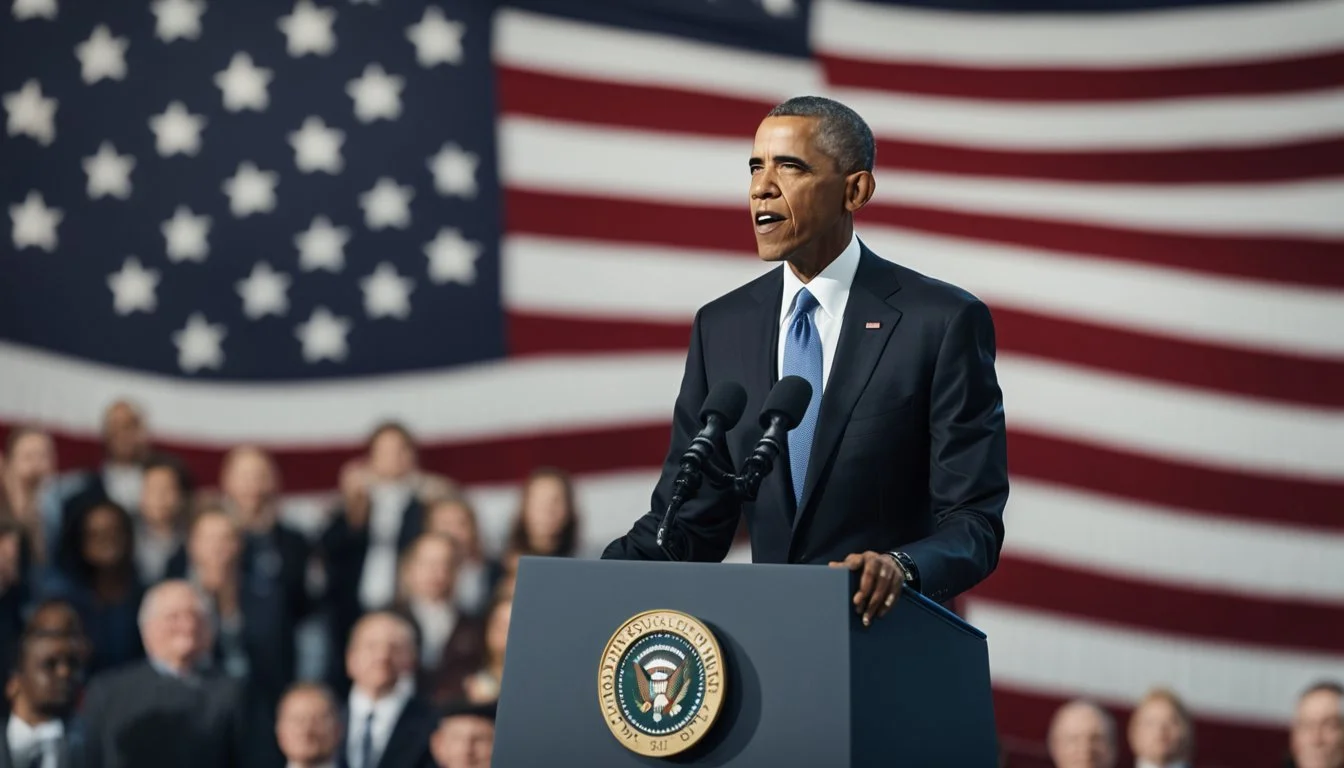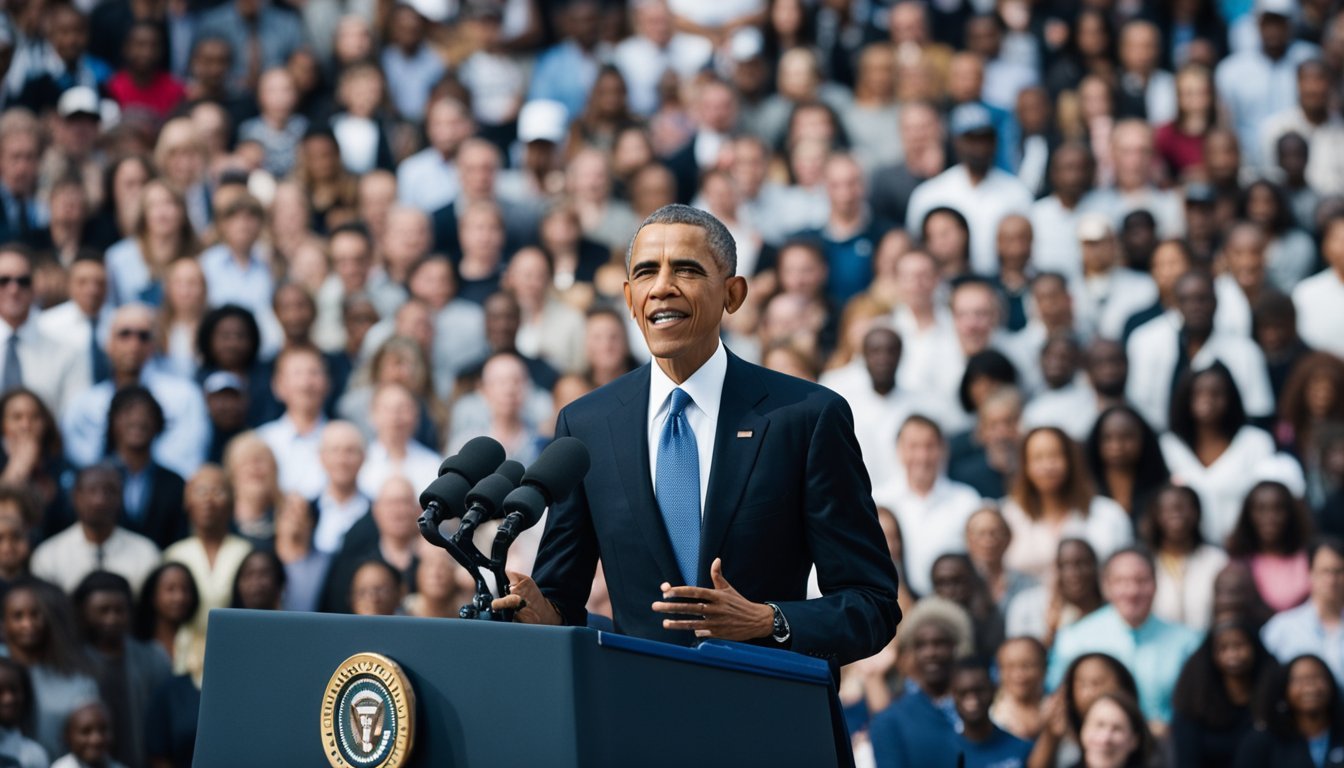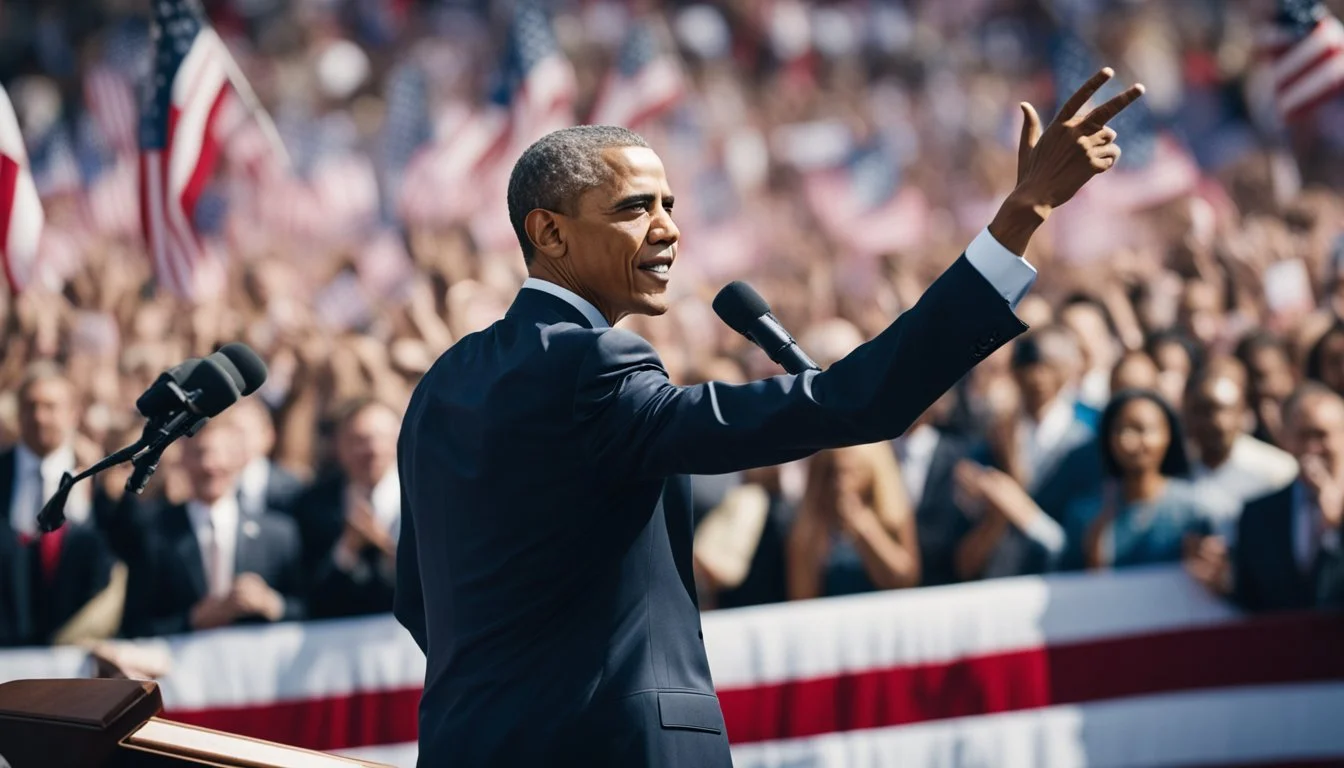Born in the USA? Unraveling the Obama Birthplace Saga
The birthplace controversy surrounding Barack Obama has been a persistent topic of debate since his rise to political prominence. Rumors and conspiracy theories claimed he was born in Kenya, not Hawaii, which would have made him ineligible for the U.S. presidency. Barack Obama was born in Honolulu, Hawaii, on August 4, 1961, as confirmed by his official birth certificate released by the White House in 2011.
Despite this evidence, the "birther" movement continued to spread misinformation. Some supporters of Obama's political opponents circulated unfounded claims about his birthplace during the 2008 presidential campaign. These rumors gained traction in certain circles, leading to demands for Obama to prove his citizenship.
The controversy persisted even after Obama's presidency, with various fake documents and manipulated images circulating online. However, official records, including newspaper announcements from 1961, consistently support Obama's Hawaiian birth. The birther claims have been thoroughly debunked by fact-checkers and government officials, yet they continue to resurface periodically on social media platforms.
Origins of the Controversy
The controversy surrounding Barack Obama's birthplace emerged during his 2008 presidential campaign. It quickly gained traction through various channels and evolved into a widespread conspiracy theory.
Birth Announcements and Early Claims
Obama's birth was announced in two Honolulu newspapers in August 1961. These contemporaneous records provided strong evidence of his Hawaiian birth. Despite this, rumors began circulating in 2004 that Obama was born in Kenya.
World Net Daily, a conservative website, played a significant role in promoting these claims. They published numerous articles questioning Obama's birthplace and citizenship status.
Campaign Influence and Accusations
During the 2008 Democratic primary, some supporters of Hillary Clinton circulated emails questioning Obama's eligibility to run for president. However, there is no evidence that Clinton or her official campaign staff were involved in spreading these rumors.
The controversy gained more attention as the general election approached. Critics demanded to see Obama's long-form birth certificate, claiming the short-form version released by his campaign was insufficient proof.
Rise of the Birther Movement
The term "birther" emerged to describe those who doubted Obama's U.S. citizenship. This movement gained momentum after Obama's election, with prominent figures like Donald Trump becoming vocal proponents.
Birthers claimed Obama was born in Kenya, despite lack of evidence. They argued his birth certificate was forged and that he was ineligible to be president.
The controversy persisted throughout Obama's presidency, despite official verification of his Hawaiian birth by state authorities. It became a significant political issue, influencing public discourse and policy debates.
Legal and Political Implications
The birther controversy surrounding Barack Obama's birthplace raised significant legal questions and had far-reaching political consequences. It challenged constitutional requirements for presidential eligibility and impacted Obama's presidency.
Constitutional Eligibility Requirements
The U.S. Constitution states that only "natural born citizens" are eligible to become president. This clause has been interpreted to mean individuals born on U.S. soil or to U.S. citizen parents abroad.
Despite the release of Obama's birth certificate showing he was born in Hawaii, some continued to question his eligibility. Legal scholars overwhelmingly agreed that Obama met the natural-born citizen requirement.
The controversy highlighted the need for clearer definitions of presidential eligibility criteria in modern times.
Supreme Court Cases and Findings
Several lawsuits challenging Obama's eligibility reached the Supreme Court. The Court consistently declined to hear these cases, effectively upholding lower court dismissals.
In 2012, the Alabama Supreme Court rejected a lawsuit questioning Obama's citizenship. Chief Justice Roy Moore dissented, arguing the issue deserved further examination.
These legal challenges ultimately failed to gain traction in the judicial system. Courts generally viewed the birther claims as lacking merit or standing.
Political Impact on Obama's Presidency
The birther controversy had significant political ramifications for Obama's presidency. It fueled partisan divisions and undermined his legitimacy in some circles.
Obama was forced to address the issue publicly, diverting attention from his policy agenda. The White House's decision to release his long-form birth certificate in 2011 aimed to quell persistent rumors.
The controversy influenced political discourse, with some politicians using it to appeal to certain voter bases. It contributed to a climate of distrust and polarization that persisted throughout Obama's tenure.
Investigation of the Claims
Numerous organizations, government agencies, and media outlets examined the allegations surrounding Barack Obama's birthplace. They conducted thorough investigations to verify the facts and address public concerns.
Fact-Checking Organizations' Role
FactCheck.org and PolitiFact played crucial roles in investigating the claims. These nonpartisan organizations meticulously examined available evidence and documents.
FactCheck.org physically inspected Obama's original birth certificate in Hawaii. They confirmed its authenticity and reported their findings to the public.
PolitiFact conducted extensive research, reviewing official statements and documents. They rated claims about Obama's foreign birth as "Pants on Fire" - their lowest truth rating.
The Hawaii Department of Health's Statements
The Hawaii Department of Health repeatedly confirmed Obama's birth in the state. Dr. Chiyome Fukino, the department's director, issued official statements verifying the existence of Obama's original birth certificate in their records.
Governor Linda Lingle, a Republican, also publicly confirmed the authenticity of Obama's Hawaii birth certificate. She stated that health department officials had personally verified the document to her.
The department maintained its position despite persistent inquiries and legal challenges. They consistently upheld the validity of Obama's Hawaiian birth records.
Media Accounts and Expert Analyses
Major news outlets conducted their own investigations into the birthplace claims. The Associated Press, Los Angeles Times, Honolulu Advertiser, and Honolulu Star-Bulletin all published reports confirming Obama's birth in Hawaii.
These media organizations interviewed hospital staff, examined public records, and consulted legal experts. Their findings consistently supported the fact that Obama was born in Honolulu on August 4, 1961.
Several document experts analyzed the released birth certificate. They concluded that the document showed no signs of forgery or manipulation.
Documentation and Evidence
Various official documents and records have been released to verify Barack Obama's birthplace. These include birth certificates, government records, and statements from officials. Photographic evidence and eyewitness accounts have also played a role in supporting the documentation.
The Certification and Long-Form Birth Certificates
In 2008, the Obama campaign released a Certification of Live Birth from Hawaii. This short-form document confirmed Obama's birth in Honolulu on August 4, 1961. Critics argued it was insufficient proof of citizenship.
In response to continued questions, Obama obtained and released his long-form birth certificate in 2011. This more detailed document provided additional information, including the hospital name and attending physician's signature.
Both certificates were issued by the Hawaii Department of Health, the official state agency responsible for maintaining vital records.
Authenticity Verification and Records Release
Hawaii officials repeatedly confirmed the authenticity of Obama's birth records. In 2008, Dr. Chiyome Fukino, director of the Hawaii Department of Health, verified she had personally seen the original vital records.
In 2011, Hawaii's health director Louise Palafox stated that she witnessed the copying of the original certificate. The White House released the long-form certificate online and provided access to the physical copy for reporters to examine.
Judith Corley, Obama's lawyer, traveled to Hawaii to obtain certified copies of the long-form certificate directly from the Department of Health.
Photographic Evidence and Eye-Witness Accounts
Photographs of Obama as a child in Hawaii support his birth there. Classmates and teachers from his school days in Hawaii have provided eyewitness accounts of his presence.
A birth announcement published in the Honolulu Advertiser on August 13, 1961, lists the birth of a son to "Mr. and Mrs. Barack H. Obama." This contemporaneous record corroborates the official documentation.
Hospital records and staff recollections have been cited, though privacy laws limit the release of specific medical information without consent.
Personal Accounts and Statements
Barack Obama's birthplace controversy sparked numerous personal accounts and official statements. Key figures addressed the issue through various channels, shaping public discourse and perception.
Barack Obama's Personal Response
Barack Obama directly addressed the birthplace controversy in public statements. He expressed frustration with the persistent rumors, emphasizing his birth in Hawaii. Obama released his long-form birth certificate in 2011 to quell doubts.
In a televised statement, he called the issue a distraction from more pressing national concerns. Obama's memoir "Dreams from My Father" also detailed his upbringing in Hawaii.
Statements by Campaign and White House Officials
Robert Gibbs, Obama's press secretary, repeatedly affirmed the president's Hawaiian birth. He dismissed the controversy as baseless during White House press briefings.
Campaign officials released Obama's short-form birth certificate in 2008. They directed inquiries to Hawaii's Department of Health, which verified the document's authenticity.
The White House maintained a consistent message, rejecting claims of foreign birth as unfounded conspiracies.
Public Perception and Personal Records
Public opinion on Obama's birthplace varied widely. Polls showed a significant portion of Americans doubted his U.S. birth, despite official records.
Hawaii's Department of Health confirmed Obama's birth certificate multiple times. State officials, including the governor, vouched for its authenticity.
Newspaper birth announcements from 1961 in Honolulu publications corroborated Obama's Hawaiian birth. These historical records provided additional evidence to support his citizenship claims.
Social media platforms became battlegrounds for conflicting views on Obama's origins. Fact-checking organizations worked to debunk false claims circulating online.
Aftermath of the Controversy
The birther controversy left lasting impacts on American politics and society. Legal challenges, ongoing conspiracy theories, and shifts in political discourse emerged in its wake.
Legal Actions and Repercussions
Several lawsuits challenged Obama's eligibility to serve as president. Orly Taitz, a prominent birther activist, filed multiple cases in federal courts. These suits were consistently dismissed for lack of standing or merit.
In Maricopa County, Arizona, Sheriff Joe Arpaio launched an investigation into Obama's birth certificate. The Arizona Republic reported that Arpaio's probe cost taxpayers significant amounts of money.
Some states considered or passed "birther bills" requiring presidential candidates to prove their citizenship. These laws faced criticism for potentially violating constitutional requirements for presidential eligibility.
Ongoing Conspiracy Theories and Dissemination
Despite official rebuttals, birther theories persisted. Websites like Obamasnippets.com spread misinformation and doctored "evidence" claiming Obama's birth certificate was forged.
Social media platforms became breeding grounds for conspiracy theories. Spoof articles and manipulated images circulated widely, fueling continued doubts among some segments of the population.
Fact-checking organizations worked to debunk false claims, but the rapid spread of misinformation often outpaced efforts to correct it.
Effect on Contemporary Politics and Policy
The birther controversy influenced political discourse beyond Obama's presidency. It contributed to increased polarization and distrust in traditional media sources.
Some politicians used birther rhetoric to appeal to certain voter bases. This tactic sometimes backfired, damaging credibility and alienating moderate supporters.
The episode prompted discussions about the role of fact-checking in politics and media. News organizations developed more robust verification processes to combat the spread of misinformation.
Legislation addressing online misinformation and social media accountability emerged in part as a response to the birther controversy and similar conspiracy theories.
Comparative Analysis of Similar Controversies
Birthplace controversies have affected political figures beyond Barack Obama. Other U.S. presidents faced citizenship questions, while international examples show similar disputes in different contexts.
Other American Presidents and Citizenship Questions
Chester A. Arthur, the 21st U.S. president, faced accusations of being born in Canada rather than Vermont. Critics claimed this made him ineligible for office. Arthur's father was born in Ireland, fueling speculation about Chester's true birthplace.
John McCain's eligibility was questioned due to his birth in the Panama Canal Zone. The Senate passed a resolution declaring McCain a natural-born citizen, affirming his presidential eligibility.
Ted Cruz, born in Canada to an American mother, faced challenges during his 2016 presidential campaign. Legal scholars generally agreed Cruz qualified as a natural-born citizen through his mother's citizenship.
International Examples of Birthplace Disputes
In the United Kingdom, Boris Johnson's American birth sparked debates about his loyalty. Johnson renounced his U.S. citizenship in 2016, resolving the issue before becoming Prime Minister.
French far-right politician Marine Le Pen faced unfounded rumors about being born in Switzerland. These claims attempted to undermine her nationalist credentials.
Alberto Fujimori, former President of Peru, was accused of being born in Japan. This controversy persisted throughout his presidency, though he maintained he was born in Lima.



